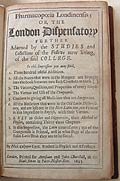 |
|
| Nicholas Culpeper, Pharmacopoeia Londinensis; or, The London Dispensatory. London: Printed for Awnsham and John Churchill, 1695. deB Eb/1695/C | |
The Bard
Charles Dibdin (1754-1814) was an English dramatist, and song-writer. In 1784 he was imprisoned for debt. In 1787, after his release from prison, he decided to emigrate to India. To raise money for the journey, he toured England, singing his own compositions. Dibdin never quite made it to India. He disembarked at Torbay because of an illness at sea. The first edition of his narrative of his travels and performances is displayed here. Apart from songs like Pomposo, he includes comments on the slave trade, bull-baiting, law and equity, and teaching.
The Apothecary
Nicholas Culpeper (1616-1654) was an apothecary, puritan and republican who is chiefly remembered for his Complete Herbal (1653), a work that popularized herbalism and was important in the development of botany and pharmacology. He was unpopular among his contemporaries, partly because of his unauthorized English translation of the College of Physicians' Pharmacopoeia (1649). Thus the contents were made available for the first time to the poor who could not afford doctor's fees. This is a later printing with the subtitle The London Dispensatory (1695). It contains his justification for continuing with his work.
Links
The English physitian: or an astrologo-physical discourse of the vulgar herbs of this nation.
